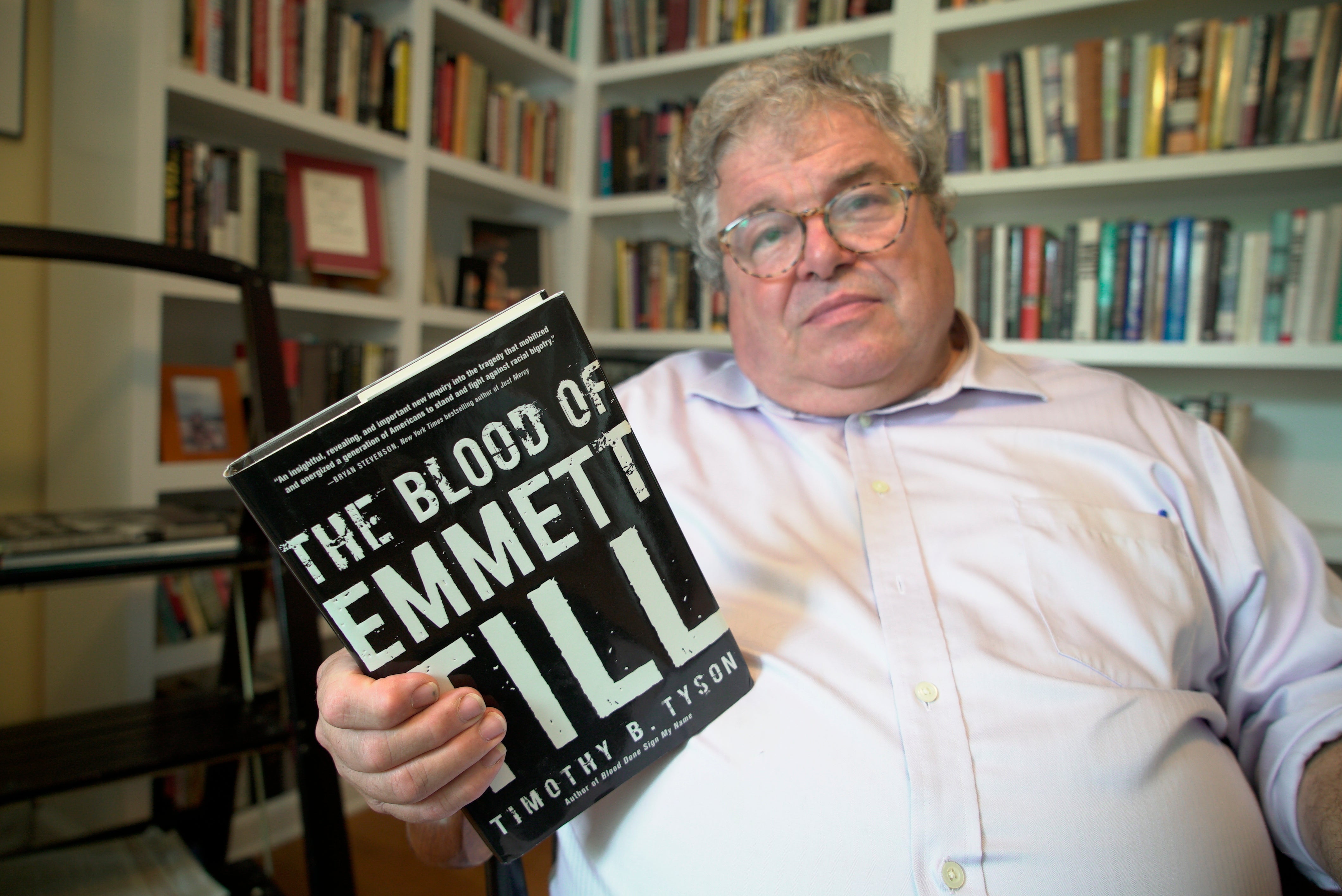Emmett Till’s accuser Carolyn Bryant dies, leaving Till family searching for justice and answers
Nobody has been convicted of any crimes in connection with the 14-year-old’s lynching in 1955, Alex Woodward and Josh Marcus report


Carolyn Bryant Donham, the white woman whose dubious allegations spurred the infamous 1955 killing of Black teenager Emmett Till, has died at age 88.
Donham, who had previously been diagnosed with cancer, was receiving hospice care in Louisiana. The Calcasieu Parish coroner’s office confirmed her death to Mississippi Today on 27 April.
Till was kidnapped, tortured, beaten and shot before his body was tied to a fan blade and weighed down in a river. Photos of his grieving family and mangled body at an open casket funeral helped galvanise the civil rights movement and shine a light on the viciousness of racist violence in the Jim Crow South.
Till’s mother Mamie Till-Mobley, who died in 2003, was pictured in a defining image at the service. “I wanted the world to see what they did to my boy,” she said at the time.
Malik Z Shabazz, an attorney for the Till family, said Bryant, who accused Till of making lewd remarks and grabbing her around the waist in a grocery store in Money, Missippi, left behind a legacy of “dishonesty and injustice.”
“Carolyn Bryant’s death brings a conclusion to a painful chapter for the Emmett Till family and for Black peoples in America,” Mr Shabazz told Capital B News. “The tragic part about Bryant’s death was that she was never held accountable for her role in the death of young Emmett Till, who is the martyr for the Civil Rights Movement.”
The men who killed the 14-year-old Black boy, Donham’s then-husband Roy Bryant and brother-in-law JW Milam, were acquitted by an all-white jury. They admitted to their crimes in a magazine interview a few months later. Both men have since died.
Donham was never convincted with any crime, nor was she ever charged. Subsequent investigations have shown inconsistencies in her explosive account of what hapened between her and Till.
A last chance at justice
Multiple local and federal investigations have re-examined the case.
Last August, a grand jury in Leflore County, Missippie, declined to indict her.
The long-running inquiry into the truth behind what happened to Emmett Till began a new chapter that June, when an unserved warrant charging Ms Donham along with Bryant and Milam was discovered in a county courthouse basement. After Till’s murder, Donham was never taken into custody or charged with any crime in the decades that followed.
Following several hours of testimony from investigators and witnesses, a grand jury determined there was not enough evidence to indict Ms Donham on charges of kidnapping and manslaughter. The case marked one the final chances to amend the record on a historic crime that’s been scrutinised for decades.
“The murder of Emmett Till remains an unforgettable tragedy in this country and the thoughts and prayers of this nation continue to be with the family of Emmett Till,” District Attorney Dewayne Richardson said in a statement.
The Rev Wheeler Parker Jr, Till’s cousin and the last living witness to his abduction in 1955, said in a statement that the grand jury’s decision was “unfortunate, but predictable.”
“The prosecutor tried his best, and we appreciate his efforts, but he alone cannot undo hundreds of years of anti-Black systems that guaranteed those who killed Emmett Till would go unpunished, to this day,” he said at the time.
“The fact remains that the people who abducted, tortured, and murdered Emmett did so in plain sight, and our American justice system was and continues to be set up in such a way that they could not be brought to justice for their heinous crimes.”
Federal investigators open – and close – two cases
It wasn’t the first time officials re-examined the shocking killing.
In 2004, the US Department of Justice opened an investigation to potentially weigh state-level charges in the case, though a grand jury declined to issue any indictments in 2007, and federal prosecutors closed their inquiry.
A federal investigation reopened in 2018 following the publication of Timothy Tyson’s The Blood of Emmett Till. The author said Ms Donham told him in a 2008 interview that her trial testimony was false – though her family has denied that she ever recanted her testimony.
The Justice Department renewed its probe after Ms Donham also “denied to the FBI that she ever recanted her testimony and provided no information beyond what was uncovered during the previous federal investigation,” according to federal prosecutors.
Federal prosecutors closed the investigation a second time in December 2021, claiming to find “no new evidence” suggesting that either Ms Donham or any other living person was involved in Till’s abduction and murder.
“Even if such evidence could be developed, no federal hate crime laws existed in 1955, and the statute of limitations has run on the only civil rights statutes that were in effect at that time,” the agency said in a statement.
“As such, even if a living suspect could now be identified, a federal prosecution for Till’s abduction and murder would not be possible,” according to investigators.
The DoJ also concluded that Mr Tyson’s account of the recantation was filled with “numerous inconsistencies.”

The historian failed to keep reliable notes and tape transcripts of the confession, according to a review from the Mississippi Center for Investigative Reporting.
In March of 2022, the office of Mississippi Attorney General Lynn Fitch also said investigators were unlikely to open another case.
“This is a tragic and horrible crime, but the FBI, which has far greater resources than our office, has investigated this matter twice and determined that there is nothing more to prosecute,” chief of staff Michelle Williams said in a statement.
But the discovery of the warrant for Ms Donham’s arrest – which the Leflore County sheriff did not issue at the time because he did not want to “bother” her – amounted to new evidence, according to the Emmett Till Legacy Foundation.
Other questions about the reliability of her story have emerged.
At various points, in interviews with defence lawyers and later federal agents, the accuser gave conflicting accounts about when Till whistled, how he touched her, who she told about the alleged incident, and how or if she identified Till to her family members who later killed him.
Donham, according to an unpublished memoir viewed by the Associated Press, has also claimed that she did not recognise Till.
Witnesses to the incident say they never saw Till say or do anything inappropriate.
“While I was in the store, Bobo did nothing inappropriate,” Simeon Wright, Till’s cousin, recounted in his 2010 memoir, using a family nickname for Till. “Bobo didn’t ask her for a date or call her ‘baby.’ There was no lecherous conversation between them.”
A new class of hate crime, a century in the making
The year before Till was killed, the US Supreme Court overturned the “separate but equal” doctrine in its landmark Brown v Board of Education case to end legal segregation. Cities and states across the US resisted the court with violence and in protracted legal battles that took decades to resolve, with their legacies imprinted in private schools that fought integration and in deteriorating public school systems nationwide.
More than 6,500 people, mostly Black Americans, were killed in racist attacks between 1865 and 1950. That time period encompassed the aftermath of the US Civil War and emancipation, white militia terror during Reconstruction, and the years surrounding the Civil Rights movement, according to the Equal Justice Initiative.
In the year after the Supreme Court’s ruling in the Board case, several public acts of racist violence in Mississippi preceded Till’s killing. The Rev George Lee – the first Black man to register to vote in Humphreys County in decades – was fatally shot for doing so. In Lincoln County, Lamar Smith was shot to death for telling people to register.
It took almost 100 years before such acts of racist violence would be recognised under federal law.
In 2022, President Joe Biden signed the Emmett Till Anti-Lynching Act into law, making lynching a federal hate crime.
The law designates lynching as a crime punishable by up to 30 years in prison. It passed the House of Representatives on 7 March by a vote of 433-7 and cleared the US Senate by unanimous consent.

